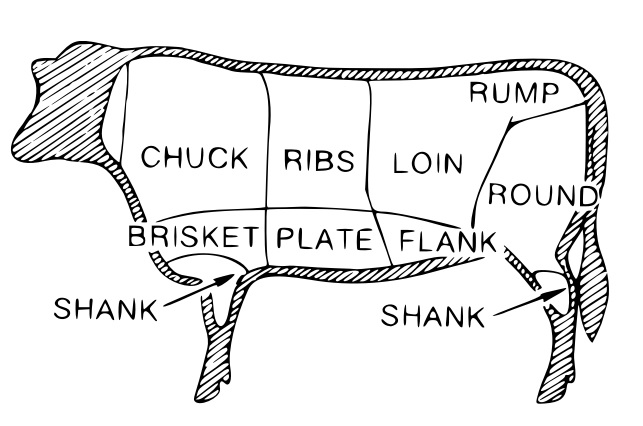Society produces more of some things than it knows what to do with.
Commodification, treating everything we produce as fungible units to be bought, sold, and consumed, is one of the gross sins of modern civilization. Although commodification can lead to problems like overconsumption and waste, thinking in these terms can help make sense of the way the world works, especially a world where, whether we like it or not, everything is a commodity. At first glance, hamburger and gasoline might seem like unrelated commodities, but together they illustrate an often overlooked truth about supply and demand and how we might not be able to solve some problems as easily as we hope. What’s more, that truth can be extended to a population we don’t ordinarily think about as a commodity: extra young men.
How does it all tie together? Come on, I’ll show you.
Grass-fed beef producers have a problem that comes in the form of an animal. Some may be a little larger or smaller, but beef cattle all have a standard inventory of parts. Before the pandemic, there was a solid market for cuts of beef like T-bone steaks, tenderloin, and brisket, but since there are no all-ribeye cows, a whole lot of beef trim remains after the popular cuts are sold.

These random bits are what go into ground beef, but a customer who is willing to shell out a premium for grass-fed steak may not be willing to pay “extra” for high-end hamburger. As a result, small-time producers found their freezers filling up with a glut of ground beef, hampering their ability to sell more steaks until a market for mince could be found. Premium fast food chains like Elevation Burger and Shake Shack absorb some of this excess, but until grass-fed ground beef finds mass-market acceptance, the availability of reasonably priced grass-fed steaks is tied to other consumers willing to eat expensive burgers, a choice that has been discouraged in recent years.
Oddly enough, the pandemic reversed this when restaurants closed their doors and more people started cooking at home. Demand for cheap ground beef soared, while producers couldn’t sell the good stuff. The average steer’s steady steak-to-trim ratio meant that tenderloins and ribeyes got dumped in the grinder along with the chuck, raising the quality (and price) of the grocery store staple.
Perhaps surprisingly, a similar dynamic plays out in the plant-based beverage industry, which is intertwined with the meat industry. If meat and dairy production falters, so too will the producers of plant-based “milks” when they can no longer sell their oat straw as bedding and the leftover residue as animal food, or buy manure and slaughterhouse by-products to fertilize the fields.
A barrel of oil is a bit like a cow. Just like there’s a certain ratio of steaks to trim, so too is there a ratio of oil-derived products that can be made from a barrel of crude. For refineries to keep being able to produce diesel fuel and home heating oil at reasonable prices, for example, they also need to have other markets willing to pay for aviation fuel, lubricants, and the half a barrel which is refined into gasoline. So if advocates for an all-electric fleet have their way and demand for gasoline plummets, refineries cannot pivot to turning the whole barrel into, say, asphalt. What would happen to the excess gasoline? Before widespread automobile use created a market for it, gasoline was a by-product poured into rivers. Now, it might be flared off or used some other way, but it would still be burned, minimizing the “green cred” of an electric car mandate.
All of which brings us to a strange commodity: extra young men.
Think back to the start of the Arab Spring. On December 17th, 2010, Mohamed Bouazizi, a Tunisian vegetable vendor, set himself on fire. He died a few weeks later, but his sacrifice sparked a movement that spread across the Arab world. It should be no surprise that a society full of unattached, extra young men with few opportunities, who have little chance of finding meaningful work and who can’t afford to settle down and start a family, can rapidly destabilize.
A recent study in Philadelphia, PA, demonstrated a strong correlation between chronic unemployment (defined as being out of work for at least a year) and gun violence. Philadelphia zip codes with high levels chronic unemployment also had more shooting victims. The correlation was strongest among Black and Hispanic men and boys aged 16-64. Similarly, zip codes with low levels of chronic unemployment had fewer instances of gun violence, with over 80% of the city’s zip codes demonstrating either the high or low correlation pattern. Philadelphia’s extra young men, like many throughout history, need a purpose, something more to occupy them before the problem grows.
Traditionally, militaries and monasteries absorbed extra young men with bleak prospects, providing skills, honor, support, and a way to serve their society (more or less). When the national urge for military adventurism wanes and the religious orders are out of fashion, these extra young men need another focus for that energy. They might not set themselves on fire, but alienated low-status youths feed the “incel” subculture, crime gangs, prison populations, religious extremism, far-Right movements, and civil unrest.
It’s offensive to think of people as commodities. However, just as our cattle and oil industries produce a certain amount of hamburger and gasoline that we must find a way to use if we want those industries to continue existing, we also have to provide the means for our culture’s extra young men to have a life worth living. There’s so much real work that needs to be done, that matching these youths with meaningful tasks should be a no-brainer, but here we are.
Related: Market Corrections: Oil and Dating


Join the conversation!